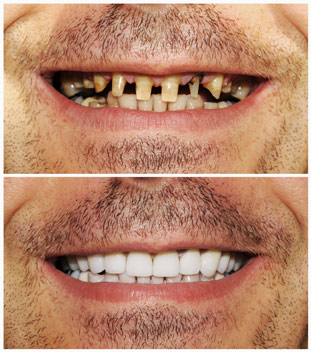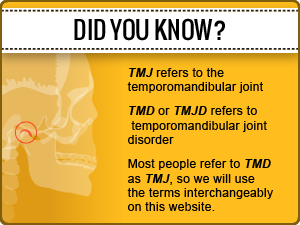Dental Implants
TMJ treatment: Dental implants
 Any type of disruption to your natural bite, which refers to the natural alignment of your teeth, can lead to TMJ. The temporomandibular joint consists of the temporal bone – part of your skull -, the mandible or lower jaw bone and the joint that attaches the temporal bone to the mandible. You use these areas of your mouth when you eat, talk and chew.
Any type of disruption to your natural bite, which refers to the natural alignment of your teeth, can lead to TMJ. The temporomandibular joint consists of the temporal bone – part of your skull -, the mandible or lower jaw bone and the joint that attaches the temporal bone to the mandible. You use these areas of your mouth when you eat, talk and chew.
One or more missing teeth changes your bite and causes those bones and joints to shift positions. Both macro-trauma, which includes severe trauma to the face, and micro-trauma, which includes repetitive and stress injuries, can lead to tooth loss. Statistics show that most patients who suffer from TMJ develop the disorder after losing one or more teeth.
Do I have TMJ Disorder?
Symptoms include migraines, neck pain, jaw pain, lower back pain, snoring, sleep apnea. Use our Free TMJ Disorder Assessment ToolsWhat are dental implants?
Dental implants for TMJ treatment are a type of irreversible treatment used in patients who still suffered from symptoms after trying other methods.
It consists of three different parts and requires that the doctor uses three separate steps. The implant itself features a metal construction or a construction made from another durable material that the dentist implants inside a gap in your smile to replace the root of a missing tooth. An abutment, which is a small metal or resin piece that holds the crown in place, screws directly onto the base.
In the last step, the doctor will create a crown that mimics the natural color and size of your teeth and attach that crown on top of the abutment. Also known as osseointegration, which is a Latin word that refers to the process of blending a bone and an implant together, the implant restores the balance of your natural bite, which reduces stress on your joints and in turn reduces or eliminates your TMJ symptoms.
Why choose dental implants over dentures?
 One missing tooth does not mean that you need dentures, and most patients do not require dentists even if they have several missing teeth. Dental implants work best in patients with one or several missing teeth, and the doctor will surgically implant the device in your jaw. With proper care, you can live with the appliance for 20 years or longer.
One missing tooth does not mean that you need dentures, and most patients do not require dentists even if they have several missing teeth. Dental implants work best in patients with one or several missing teeth, and the doctor will surgically implant the device in your jaw. With proper care, you can live with the appliance for 20 years or longer.
Dentures, better known to some as false teeth, consists of multiple resin or porcelain teeth applied to a lightweight but lightweight base. Patients can slide the device inside their mouths and secure it with a small amount of adhesive. While dentures can provide some relief in the same way that TMJ implants do, the only people who can use dentures are those who have a large number of missing teeth and those who have so many decayed and damaged teeth that the doctor needs to remove those teeth.
What are snap in dentures?
Snap in dentures are a quick fix for loose dentures and can usually be done with mini implants in a single visit. These are sometimes used alone as a single treatment and other times are used to give instant improvement while more complex restorations and implants are done. Ideally patients are looking and feeling good throughout the entire treatment process.
The main difference between the two appliances is that an implant can replace a single tooth and is a permanent change, while dentures replace multiple teeth and are a temporary solution.
Are implants the right option for you?
Do you want to know if the cause of your TMJ is missing teeth or a tooth? Those spaces created by those broken, damaged and missing teeth can change the way you bite down and interfere with the way your mouth moves, which places additional strain on the temporomandibular joint.
To find out if dental implants are the right choice for you and to learn more about other treatments that can help you reduce the pain that you feel, stop in for a free consultation today.


0 Comments